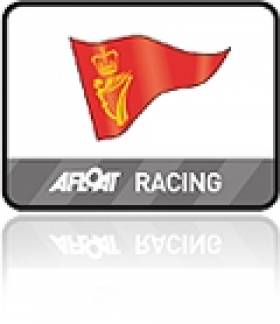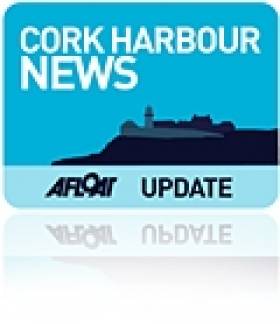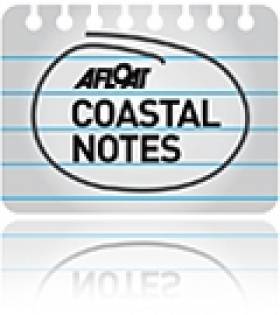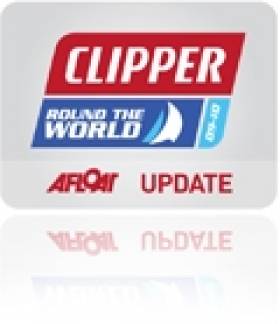Displaying items by tag: Cork
McWilliam League Starts on Friday
Just as Kinsale's Spring league ends the McWilliam Sailmakers May League takes place at the Royal Cork Yacht Club (RCYC), Crosshaven, County Cork starting next Friday. All the details are here:
1 RULES
1.1 The Regatta will be sailed under the current RRS (2009 – 2012), the ISA prescriptions, the IRC Rules, part 1, 2 and 3, the ECHO handicapping System, Class rules where applicable, by this Notice of Race and by the General Conditions and Sailing Instructions of the Royal Cork Yacht Club (RCYC) except as amended by this program. Amendments to this program and RCYC General Sailing Instructions will be posted on the RCYC notice board.
1.2 IRC Crew limitation shall not apply.
2 ELIGIBILITY AND ENTRY
2.1 A completed signed Race Entry Declaration 2010 and current valid ECHO and /or IRC certificates must be submitted before 18:00hrs on Friday 7th May 2010 in order for a boat to be eligible for a result. Boats that have not submitted a valid Race Entry Declaration and Certificate(s) may not be given a result.
2.2 Classes will be divided on the basis of their IRC TCF and the anticipated Class Divisions are as follows:
Class Rule type Parameters Class Flag
1 IRC/ECHO TCF 0.980 and above Numeral Pennant 1
2 IRC/ECHO TCF 0.920 to 0.979. Numeral Pennant 2
3 IRC/ECHO TCF 0.919 and below. Numeral Pennant 3
White IRC/ECHO No Spinnakers, Gennakers White Pennant
Sail Spinnaker poles, or
Whisker Poles
2.3 Results will only be issued to boats that have valid sail numbers clearly legible on both sides of its mainsail.
3 CLASSIFICATION
3.1 Entries must comply with ISAF Special Regulations Governing Offshore Racing for Category 4 Races.
3.2 Entries in all classes are required to fly the correct pennant. Any boat not flying the correct pennant may not be scored.
3.3 The OA reserves the right to combine Classes if the number of entries does not justify separate Classes.
3.4 Boats shall show their correct Sail Numbers. Permission to race using any other Sail Number must be sought from the Race Office prior to going afloat. Any boat not showing its correct Sail Numbers may not be scored.
3.5 The Race Committee reserve the right to place any boat in any Class they deem appropriate.
4 SCHEDULE
4.1 Dates of Racing: First Gun each day:
Friday May 7th 2010 1850
Sunday May 9th 2010 1155
Sunday May 9th 2010 as soon as possible after the finish of Race 2
Thursday May 13th 2010 1850
Thursday May 20th 2010 1850
Thursday May 27th 2010 1850
4.2 6 races are scheduled.
5 SAILING INSTRUCTIONS
The event will be sailed under the General Sailing Instructions of the RCYC.
6 VENUE
The League will be hosted by the RCYC and will be sailed in the waters of Cork Harbour and its approaches.
7 SCORING
7.1 The Low Point System of Appendix A will apply, with the following amendments:
Fire at Cork Boatyard Extinguished
Three units of Cork Fire Brigade dealt with a fire that broke out close to a diesel tank in a boatyard in Crosshaven today. No one was hurt in the blaze that broke out at lunch time and there was no damage to boats. Containers stored in the yard near a travel lift have been damaged, according to bystanders.
Baltimore Harbour Hotel for Sale
Situated on an elevated site with superb views in a popular coastal base. The Baltimore Harbour hotel in Co. Cork is for sale by private treaty. The site includes hotel suites, 6 town houses and 12 self contianed apartments. More details from Contact CB Richard Ellis, 01-618 5500 or DTZ Sherry FitzGerald, 01-639 9300.
New Cork Chart for RIBs
Admiralty Leisure, which is part of the UK Hydrographic Office is currently expanding the range of Tough Charts and the latest to be published is a Tough Chart of Cork to Kinsale which will be available next month.
The new Tough Chart (SC5915) provides coverage from Cork to Kinsale at various scales, including major rivers and estuaries printed on 16in the form of 14 robust and durable pages, all are referred to WGS84. Also included is a comprehensive index diagram based on a Standard Nautical Chart detailing coverage of this product. The product has been designed specifically for the Rigid Inflatable Boat (RIB), dinghy and wet boat enthusiast, it is also great for use on deck on any vessel sailing or racing in the area. This new Tough Chart will make the ideal accompaniment to those competing in Cork Week. Check out Afloat TVs high definition footage of this beautiful coastline below.
Cork Clipper Skipper to the Rescue
“I am delighted to learn that Hannah Jenner is available to drive Qingdao. This will be great boost to the team who have found a new taste for podiums and is keen to continue and develop that into even greater success on the next leg. Hannah is no stranger to the podium having won third overall on Glasgow, Scotland with Style in the last race. I hope my team will benefit from her great skill and maintain their momentum.”
Hannah, who had already been in San Francisco to greet the Cork Clipper and meet her new crew on their arrival through the Golden Gates, was happy to oblige and feels it will prepare her for when she takes control of the new Cork boat in for the Panama leg.
“It’s exciting to be here and I’ve now got to get my head back into race mode as I’ve been in refit mode for the last week” said Hannah. “There are a few differences between this race and Clipper 07-08 in terms of racing instructions with Scoring Gates and Stealth Modes to consider but I’m always up for a challenge and I’m definitely looking forward to this one”.
The volcanic disruption leading to the skipper substitution is only one of several natural element challenges that have affected this year’s eventful Clipper Race. In January the original Cork Clipper hit a reef in the Java Sea leaving it unsalvageable and forced the Cork Crew to split up and join other teams before they collect their new boat in Panama on the 1st of May. And it wasn’t a case of plain sailing for Cork Crew’s Gavin Kelly and Noreen Osbourne on board the California Clipper. Their 90 foot mast snapped in rolling seas in the middle of the Pacific, 2200 miles from San Francisco.
All crews were rewarded with a long stopover in San Francisco where they enjoyed a civic reception at San Francisco Yacht Club, trips to Alcatraz and even a visit from Californian
Governor Arnold Schwarzenegger. He commended the crews on their bravery, talent and hard work by saying,
“I applaud all the participants for putting their talents and skills to work. As a former professional athlete I know what it takes to excel in demanding sporting contests. Everyone here has trained hard to be ready for this once in a lifetime opportunity and you can be proud of what you have accomplished so far. To all the participants I wish you the best of luck and happy sailing.”
The Cork Clipper Crew’s adventures will come full circle when they sail into Kinsale for the Kinsale Festival July 2nd -7th in their new boat. Crew and supporters alike will be treated to an array of entertainment from international circus acts, food, arts and crafts stalls, tours and live music in Kinsale Square. The homecoming revelry will continue as they come into the Port of Cork in a Parade of Sail on July 7th -9th celebrated with live music and entertainment at the specially constructed Race Village in Albert Quay.
Cork Harbour Property with Deep Water Jetty Goes On Sale
The Marina Point Complex in Cobh, Cork Harbour is for sale. The 114–acre property includes the former IFI plant that runs on to the waterfront with a deep water jetty. No purchase price is quoted but it is understood that in early 2008 a purcahse price of Euro 40 million was suggested. The property is for sale in one or more lots.
Monkstown Bay Sailing Club

Goldie Cronin 'Alta to Starboard To Finish' Trophy Event. Photo: Alan Fleury
Monkstown Bay Sailing Club
Monkstown Bay Sailing Club is located in the picturesque village of Monkstown, which overlooks Monkstown Bay in Cork Harbour.
Dingy league races are generally held within the Bay area, while Cruiser league races extend their reach up river to Passage and out the harbour to Cobh, Whitegate and beyond. Weekend events make full use of the Harbour waters, including races to Blackrock, East Ferry and Ballynacorra, and trips to Whitebay and Crosshaven.
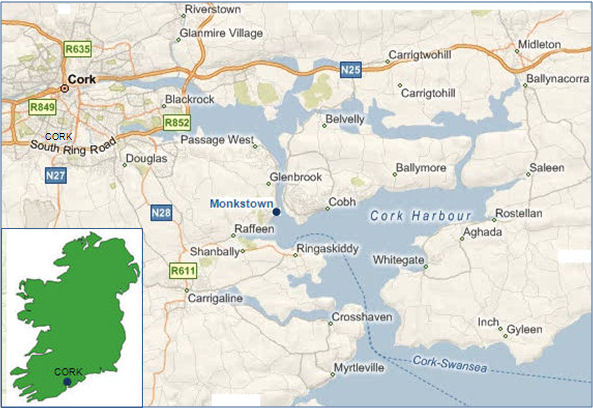
Dinghy sailing club with racing every Tuesday and Friday. All classes welcome. Annual junior training programme run during July. Clubhouse and usual facilities. Membership open. Dinghy courses offered up to Improving Skill, Advanced Boat Handling, and Racing 1.
MBSC Officers and Committee 2009
Commodore – Finian O' Driscoll – Email: [email protected]
Vice-Commodore – John O'Driscoll – Email: [email protected]
Hon. Secretary – Andrew Moynihan – Email: [email protected]
Rear Commodore – Ewen Barry – Email: [email protected]
Hon. Treasurer – John Crotty – Email: [email protected]
Sailing Secretary – Ronan Kenneally – Email: [email protected]
Junior Training Organiser – Ann O'Brien – Email: [email protected]
Monkstown Bay Sailing Club, 3 de Vesci Place, Monkstown, Co. Cork. Tel: 021 485 9935 (Club House) or 087 825 2855 (Alan Fleury), or email: [email protected]




























